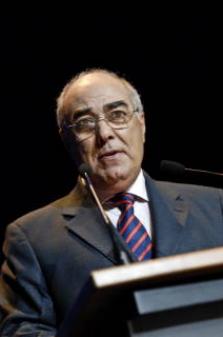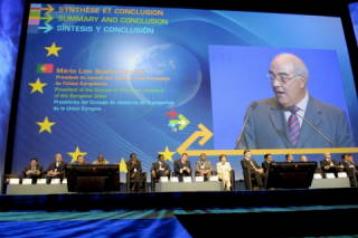In this 23rd Congress a great challenge was set upon the participants of the 113 member states of the World Road Association coming from all over the world to present the outcome of their work, to debate ideas and aspects of innovation. That challenge was the chosen theme for this Congress: The choice for a sustainable development.
In fact, it's a subject with ever growing importance and a choice that impends on all of us - on a positive or negative way. The most complicated aspect, worthy of more care and attention, relates to the consequences of that choice that not only concerns ourselves but will clearly affect, in a crescent way, the future generations.
Because it is so, in Portugal we have been working in a consistent fashion to introduce the user-payer principle.
So, the majority of our highways are paid, recurring to the highest technological standards. Portugal was one of the first countries to introduce in 1991 an electronic system to collect tolls.
Today we are the country with the highest penetration of electronic payments on a non mandatory environment: 62% of the transactions are performed in this fashion and around 50% of our automobile park already has an electronic identifier.
We are just concluding the sector management and financial model namely through the attribution of the road system concession to a company that will charge a tax for its construction, conservation and maintenance road services - The Road Service Contribution - associated to the fuel consumption.
The payment concerning this contract will also depend on the availability of roads, the quality of the service provided, the accident rate and the external environment.
As President of the EU Transport Council in exercise I must mention the correspondence of many of the themes we are addressing in this Congress to the concerns and works developed by the EU, being very grateful to notice that there are efforts in diverse sector areas, efforts of recognized specialists, that are oriented to the fulfilment of common purposes.
Also as the exercising President of the International Transports Forum (former European Conference of the Ministers of Transport, CEMT) I can't help but mentioning the existing coordination effort to reflect, face and solve the huge problems that afflict us road and road transport wise.
In fact, one of the Forum purposes is to "alert to the essential role of transport in the economy and in society", subjects related to accessibility, the environment, the infra-structures, the intermodality, road safety, taxing and the transport policies among other subjects are studied and accompanied.
Although it is common knowledge it's never too much to mention the work developed since 1953 by the CEMT aimed at harmonizing the road transport policies and contributing to the construction of a common road policy at a European scale.
At the Dublin session of May 2006, the Council of Ministers has decided to promote a reform of the CEMT and create an International Transport Forum, defining a widening of the geographic (world scale and not merely European) modal (all means of transportation and not merely the terrestrial) and intervention (representatives of governments, industry, research and civil society and not exclusively governmental representatives) dimensions.
In this new format of reflection and research the concerns with the most urgent challenges of the transport sector persist and develop.
Clear proof of the fact is the subject of one of the more recent meetings of the Council of Ministers: "How to Mitigate the Overbearing of Transports" (Sofia, June 2007) a subject actually shared by the CEMT and the World Association of Roads in one of the Special Sessions jointly organized during this Congress.
It is, no doubt, a perfectly current subject, common to many countries, and that everyone is making an effort to solve.

